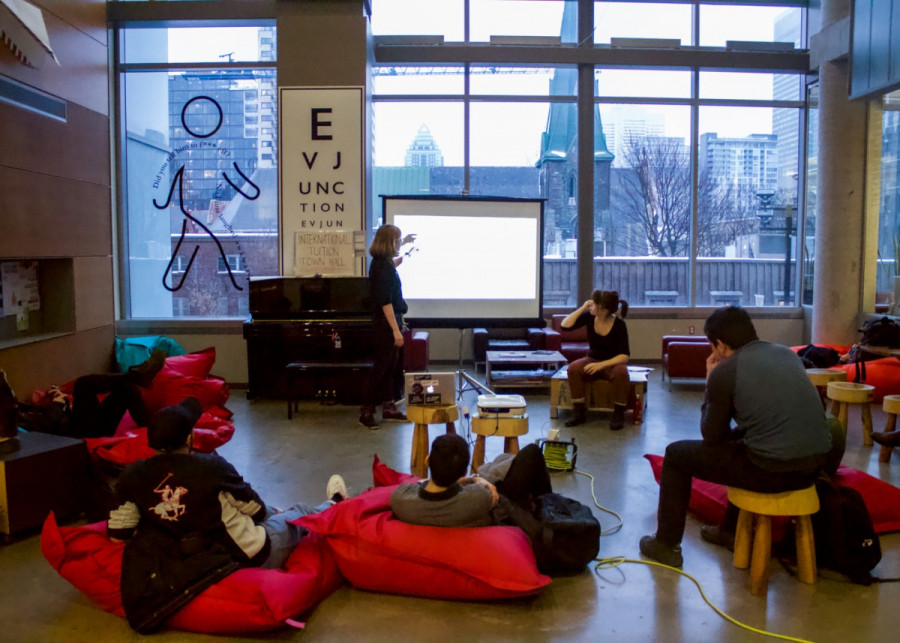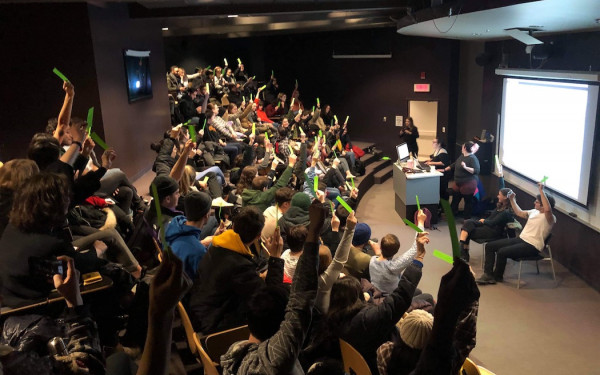CSU’s Tuition Hike Town Hall Encourages Student Diplomacy
With Looming International Student Tuition Hike, CSU Wants Students to Mobilize
Last Thursday, the Concordia Student Union hosted a Tuition Hike Town Hall, encouraging students to mobilize against higher tuition costs.
“Right now we’ve used diplomacy mostly [to pressure against a potential tuition hike] but recently we’ve decided to take a much more proactive measure, by trying to get people informed,” said event facilitator and CSU External affairs and mobilization coordinator Camille Thompson.
In May 2018, the Quebec government announced the deregulation of tuitions for all international students, with exception to those in thesis-based masters programs and PhD students.
The deregulation of tuition means that universities no longer receive funding for international students, leaving them to find their own means of funding for students. Often, this means an increase in the already high tuition for international students, compared to what Quebec residents pay.
Shortly after the government announced the deregulation of tuition, Concordia voted to increase the tuition for international undergraduate students in Engineering, Computer Science, and the John Molson School of Business by 3.28 per cent.
This increase came into effect for the 2018-2019 academic year, and further increases are projected to come into effect in Fall 2019, to be voted on sometime in May or June, according to Thompson.
“What we’ve seen in the last couple years is that [the Board of Governors] puts tuition fees on the agenda at the very last minute, and they try to put it in the month of May or June when students are in exams or on holidays,” said Thompson.
If the school does decide to proceed with a tuition hike for international students, it could have negative impact on the academic careers of many students.
One student, who declined to have their name published said that a tuition increase would prevent them from continuing their studies.
“The potential unaffordability of tuition, it means I can’t go to school,” they said. “I have to think about a lot of things when it comes to tuition, and a lot of negotiations with my family happen. I’m already under pressure with tuition now [and] if it increases, then I’m just going to have to go home.”
A topic discussed in the Town Hall was Concordia’s history of paying its administrators extremely high salaries, with the university subject of high severance packages paid out to former employees, in the past.
The university has been the subject of high severance packages paid out to former employees. In 2016, Sonia Trudel received a $235,000 severance package less than three months after taking the Chief Financial Officer position.
In January 2018, former senior administrator Benoit-Antoine Bacon received $153,220.
Incidents like these occurring over the past few years while the school simultaneously tries to gouge its international students has left some feeling undervalued by the university.
“It’s not fair, it’s just a matter of managing [their money] well,” said Nicolas Givaldo Botero, a student from Colombia studying mechanical engineering student fat Concordia.
Thompson and Searcy presented information on Quebec’s history of student movements, demonstrating the ways in which students have mobilized against austerity, their school’s administration, and the government in the past.
The two executives are setting out to form a committee to mobilize against the administration, in anticipation of a tuition hike proposal.
Some demands outlined in the petition include that the university implement a tuition freeze, and that it “addresses overinflated administrative salaries in order to combat government funding cuts instead of continuing to download costs onto international students or implementing further austerity measures.”
“My personal hope is that [the administration] accepts all the demands in the petition,” said Thompson. “That’s the goal, but we’ll see.”






1_600_375_90_s_c1.jpg)
_600_375_s_c1.png)